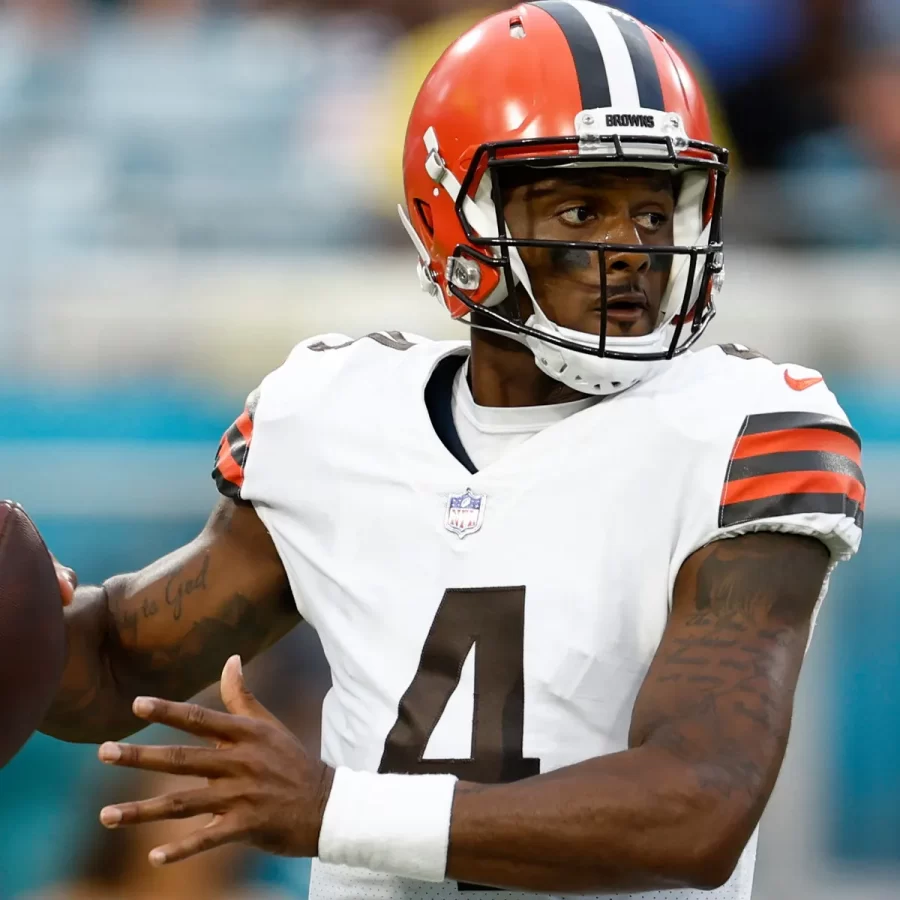NFL Player Conduct Policy
Fair or Fraudulent?
September 9, 2022
The current NFL Player Conduct Policy has played a major role in keeping NFL player’s behavior on and off of the field in check ever since its implementation in 2007, and it has become a hot topic in recent discussions relating to the league due to the increasing number of player suspensions.
Simply put, according to the conduct’s guidelines, players must refrain from engaging in any activities that would threaten the integrity and perception of the league. Which brings up an important question; does the NFL truly care about dealing a fair amount of justice to its players or simply for protecting its own image? This question has become more prominent due to the Brown’s star quarterback Deshaun Watson’s sexual misconduct investigation, after he was accused of sexual misconduct during massage sessions by more than 20 women.
While being acquitted of criminal charges, he was required to settle 23 out of 24 lawsuits and face penalties in the NFL. The NFL has a right to give a player any suspension they deem necessary.
Deshaun Watson was originally suggested by the NFL disciplinary officer to be suspended for six games, but the NFL appealed and lengthened the suspension to 11 games without pay plus a $5 million fine. This is in addition to the several lawsuits Watson must conform to.
That being said, there is an argument to be made that Watson was not given a harsh enough punishment for his alleged crime, which the NFL recognizes as a violation of their Player Conduct Policy. The NFL disciplinary officer, Sue Robinson, even commented on the crime, claiming that it is, “more egregious than any before reviewed by the NFL.”
Looking from a larger perspective, an 11 game, no pay suspension plus the large fine is nothing to a millionaire such as Deshaun Watson. Compared to another recent suspension of the Falcon’s wide receiver #1, Calvin Ridley, who was suspended an entire season for gambling on 5 games during the 2021 season, Deshaun Watson’s suspension seems generous.
Interestingly, Deshaun Watson, a very prominent and skillful player, is returning to the NFL just in time for the Browns-Texans game, which will garner a lot of media attention due to it being the matchup between Watson’s current and former teams.
There seems to be a significant difference in the suspensions of both of these players, and Deshaun Watson seems to be getting a significantly better deal, despite committing a crime that damages the NFL’s reputation more than a lesser known figure, gambling on five games while on a leave of absence from the league.
Overall, since the NFL has the final say on the length of suspensions, no matter the offense, it appears as though they are giving a lighter suspension to a profitable quarterback right before his revenge game, despite his complete disregard for the leagues policies, which highlights the league’s inconsistent discipline protocol.
While an 11-game suspension with a 5 million dollar fine has been the harshest suspension given out for a sexual misconduct investigation, most notably in comparison to retired Steeler’s star quarterback Ben Roethlisberger’s mere 6-game suspension for alleged sexual assault, it is still severely disproportionate to other league suspensions, which are ridiculously long for less severe crimes.
The NFL is attempting to “set an example” with these significantly lengthy suspensions, but is instead leaving the fans questioning where the league’s priorities lie due to the league’s creation of false images of justice and their punishments that prevent the league from losing out on attention and money.
Since 2007, the creation of the Player Conduct Policy by Commissioner Roger Goodell has had good benefits in justice of its players, but has struggled to keep a consistency on player suspensions in order to create a better look. The Player Conduct Policy needs to become a priority to change or else the league will lose the integrity it is attempting to sustain.



